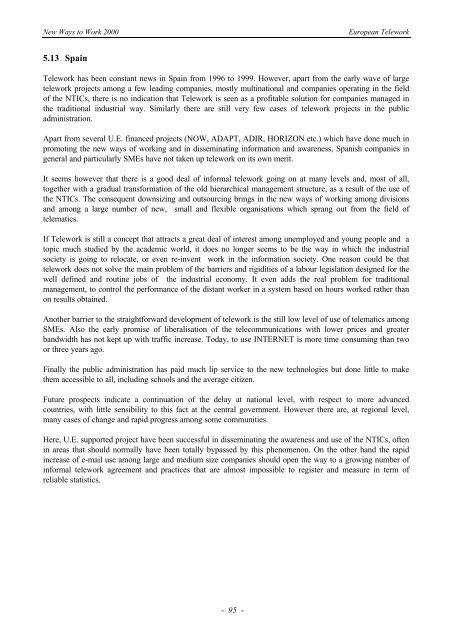eWORK 2000 - European Telework Week
eWORK 2000 - European Telework Week
eWORK 2000 - European Telework Week
- No tags were found...
You also want an ePaper? Increase the reach of your titles
YUMPU automatically turns print PDFs into web optimized ePapers that Google loves.
New Ways to Work <strong>2000</strong><strong>European</strong> <strong>Telework</strong>5.13 Spain<strong>Telework</strong> has been constant news in Spain from 1996 to 1999. However, apart from the early wave of largetelework projects among a few leading companies, mostly multinational and companies operating in the fieldof the NTICs, there is no indication that <strong>Telework</strong> is seen as a profitable solution for companies managed inthe traditional industrial way. Similarly there are still very few cases of telework projects in the publicadministration.Apart from several U.E. financed projects (NOW, ADAPT, ADIR, HORIZON etc.) which have done much inpromoting the new ways of working and in disseminating information and awareness, Spanish companies ingeneral and particularly SMEs have not taken up telework on its own merit.It seems however that there is a good deal of informal telework going on at many levels and, most of all,together with a gradual transformation of the old hierarchical management structure, as a result of the use ofthe NTICs. The consequent downsizing and outsourcing brings in the new ways of working among divisionsand among a large number of new, small and flexible organisations which sprang out from the field oftelematics.If <strong>Telework</strong> is still a concept that attracts a great deal of interest among unemployed and young people and atopic much studied by the academic world, it does no longer seems to be the way in which the industrialsociety is going to relocate, or even re-invent work in the information society. One reason could be thattelework does not solve the main problem of the barriers and rigidities of a labour legislation designed for thewell defined and routine jobs of the industrial economy. It even adds the real problem for traditionalmanagement, to control the performance of the distant worker in a system based on hours worked rather thanon results obtained.Another barrier to the straightforward development of telework is the still low level of use of telematics amongSMEs. Also the early promise of liberalisation of the telecommunications with lower prices and greaterbandwidth has not kept up with traffic increase. Today, to use INTERNET is more time consuming than twoor three years ago.Finally the public administration has paid much lip service to the new technologies but done little to makethem accessible to all, including schools and the average citizen.Future prospects indicate a continuation of the delay at national level, with respect to more advancedcountries, with little sensibility to this fact at the central government. However there are, at regional level,many cases of change and rapid progress among some communities.Here, U.E. supported project have been successful in disseminating the awareness and use of the NTICs, oftenin areas that should normally have been totally bypassed by this phenomenon. On the other hand the rapidincrease of e-mail use among large and medium size companies should open the way to a growing number ofinformal telework agreement and practices that are almost impossible to register and measure in term ofreliable statistics.- 95 -








